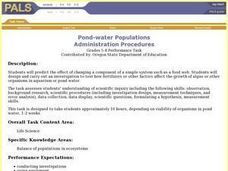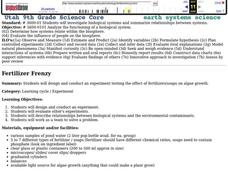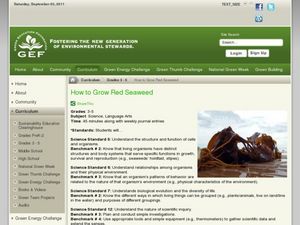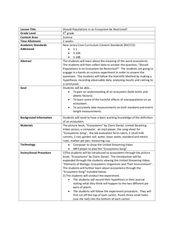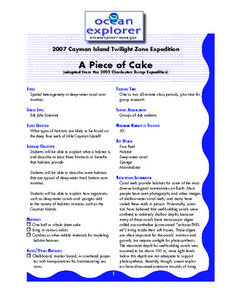Curated OER
Pond-water Populations
Pupils design and conduct and experiment on algae, for a two week period, to answer the question "In your investigation, how does changing one factor affect the growth of organisms?"
Curated OER
Some Like It Hot, Some Like It Cold
Students are explained that thermophiles are organisms that have optimal growth temperatures above 50oC. They investigate the temperature ranges for the growth of common bacteria. Students answer the question of do either of these...
Curated OER
Fertilized Death Water
Learners investigate the effect of chemicals on Platyhelminthes and planaria development. They observe the growth and development of planaria and investigate what fertilizer can do to living organisms when it is introduced into their...
Curated OER
Fungi
In this fungi worksheet, high schoolers will review the different types of fungi and the structures these fungi have for reproduction and growth. This worksheet has 5 terms used in word puzzles, 5 matching, and 5 true or false questions.
Curated OER
What Are We?
Students describe different types of water pollutants. They complete experiments in which they observe the affects of water pollution on algae. They also brainstorm and list three causes of each water pollutant.
Curated OER
Science: Dissolved Oxygen and Water Quality Sampling
Students perform tests to determine the level of oxygen dissolved in water. After examining a table displaying the temperature and solubility of water, they examine the three stages involved in the test. Upon completion, students explain...
Curated OER
Fertilizer Frenzy
Ninth graders design and conduct an experiment. They evaluate other's experiments. Students describe relationships between biological systems and the environmental contaminants. They work as a team to solve a problem.
Curated OER
Dissolved Oxygen in an Aquatic Ecosystem
Students explain why dissolved oxygen is important in aquatic ecosystems. They evaluate the optimal dissolved oxygen levels for living organisms.
Curated OER
How Diverse is That?
Compare various types of biological diversity in a coral reef and calculate a numeric indicator that describes the diversity found in coral communities. Your class can work in groups to look at the abundance and distribution data of...
Curated OER
Save a Reef!
Design a public information campaign to improve understanding of the coral reef crisis. Read about and discuss the biology and threats to the coral reef. The class creates a public information program about the problems facing the coral...
Curated OER
Kingdom: Fungi
The general characteristics of fungus types are presented here. Your class will love the pictures of the amazing features found on these strange living things. The internal and external structures and their functions are highlighted. By...
Curated OER
Kingdom: Fungi
The general characteristics that affect classification of fungi and other organisms in the domain Eukarya are detailed for the students on 12 attractive slides. Teachers can access individual slides to cover life cycles or diversity, or...
Curated OER
Pollution Solutions
Students visit a local park to test the quality of the aquatic environments. They search for sources of pollution and examples of pollution control. Based on their obeservations and experiments, they rate their local environment.
Curated OER
Water Quality and Dissolved Oxygen
Students investigate the relationship between dissolved oxygen and organic materials and aquatic organisms. This is a 3-lesson series in which students explore dissolved oxygen and then design an experiment testing the effects of changes.
Curated OER
How Does Your (Coral) Garden Grow?
Analyze and graph oxygen isotope ratios in coral samples in relation to the distance from the outer skeleton edge. Compare the data to the mean monthly water temperatures. Uncover whether or not there is any correlation. In addition to...
Curated OER
Habitat Crossword Puzzle
In this science learning exercise, students will read the clues to identify the various habitats of living creatures. Using the 18 clues, students will complete the crossword puzzle of horizontal and vertical answers.
Curated OER
How To Grow Red Seaweed
Students explore ocean biology by participating in a plant growing activity. For this seaweed lesson, students identify the importance and uses of seaweed in the ocean and examine different seaweed samples. Students utilize an aquarium,...
Curated OER
Should Populations in an Ecosystem be Restricted?
Fourth graders experiment to determine how overpopulation effects ecosystems specifically plants. In this ecosystem lesson, 4th graders conduct an ecosystems experiment after listening to Claire Daniel's, Ecosystems. They watch a video,...
Curated OER
Oyster Culture Cycle Worksheet
In this oyster culture cycle worksheet, students answer 31 questions about the six stages of the oyster culture cycle. They also answer questions about the oyster business.
Curated OER
A Piece of Cake: Ocean Communities
Young scholars explain habitats. In this model based lesson students create a model to help describe a habitat that is typical of deep-water. Young scholars will describe how organisms such as coral and sponges add to their habitat.
Curated OER
Deep Gardens
Students compare and contrast deep-sea coral reefs with shallow-water coral reefs. In this underwater ecology lesson, students describe three types of coral and explain why scientists are concerned about the future of deep-sea coral.
Curated OER
What's Down There
Students write an essay about the coral reefs. In this oceanography lesson, students investigate the reef of Bonaire and compare it to reefs that are not thriving. Students then explore the differences that contribute to the overall...
Curated OER
How do living and non-living structures affect coral reef habitats?
Students create model coral reefs showing surface area and including examples of communities. In this coral reef activity, students research and explore the functions or benefits from a coral reef. Students design a benthic habitat....
Curated OER
Plant Lifecycles
Students examine the life cycle of plants. In this plants activity, students identify the various stages of plants and their parts. Students compare the life cycle of a plant with that of an animal. Activities suggested can be modified...


